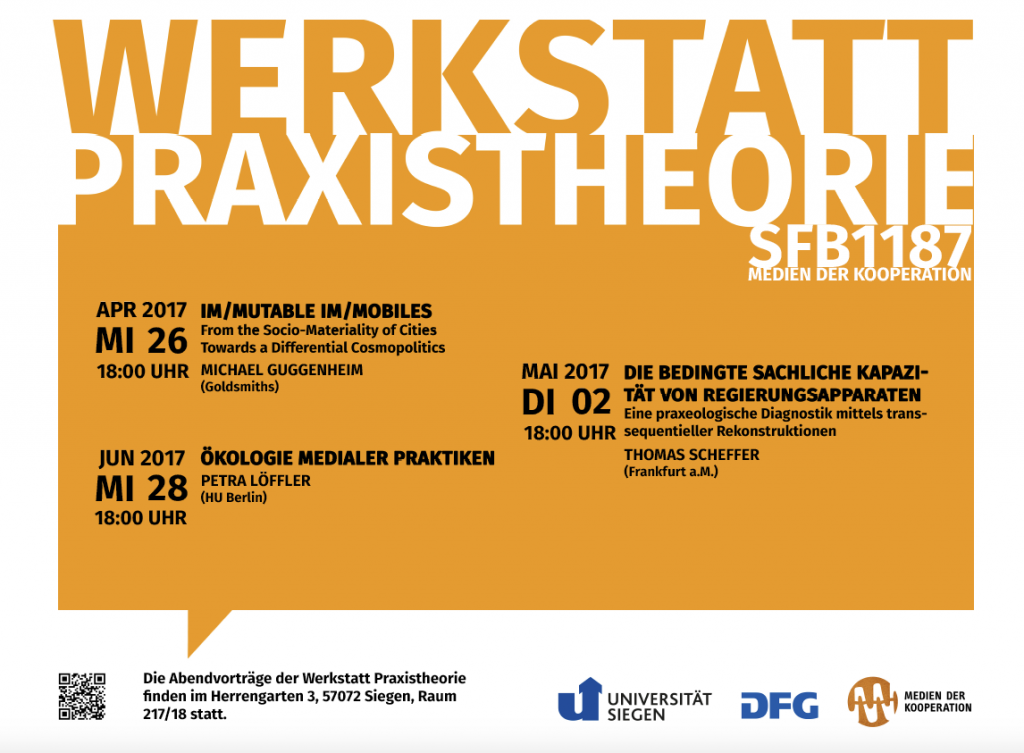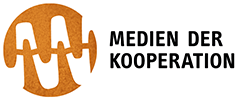Workshop Practice Theory Summer 2017
This semester the workshop practice theory will focus on media practices of delegation.
The lecture and workshop series on Practice Theory aims to develop a new perspective on media history and media analysis. It is giving primacy to “practice” while focussing on processes of media production and work. We set out exploring media practices related to “coordination”, “delegation”, “registration & identification”, both with regard to a sound empirical foundation and to theoretical reflection. These categories are used to investigate media practices that specifically interconnect publics and infrastructures. Our lecture and workshop series on Practice Theory is dedicated to “Theoretical Empiricism” and will assemble international research that addresses questions of theory and empirical research symmetrically. For this purpose, three further categories are brought into play as part of the practice turn, namely repair work, experimentation, and actualization.

Talks in the Summer Term 2017
Wednesdays at 18:00
Campus Herrengarten, Room AH-217/18
In this talk I aim to provide one possible answer to a simple question: How can we adequately theorize the built world we inhabit? How can we rethink the built world beyond the rural-urban distinction that lumps together places that are very unlike each other? My answer is to devise a differential cosmopolitics, a different way thinking about materialized practices that allows us to see changing morphologies of modern socio-materialities. The built world I suggest is patterned by different kinds of objects with different kinds of agency. Starting with the well-known idea of immutable mobile, I show that we can discern mutable mobiles (things, plasma), mutable immobiles (buildings) and immutable immobiles (infrastructures). I discuss two recent morphological shifts to the modern patterning of sociomaterial agency: assemblies without buildings and locational technologies that replace buildings.
In diesem Vortrag entwerfe ich ein trans-sequentielles Panorama, das entlang meiner bisherigen Ethnographien die Arbeit in Ämtern, Gerichten, Parlamenten oder Polizeistationen auf ihre sachlichen Kapazitäten hin vermisst. Dabei verknüpft die Objekt-zentrierte, trans-sequentielle Analyse Praxisforschung und Diskursanalyse und öffnet diese hin zur Gegenwartsdiagnose. Die Problembearbeitungskapazität der staatlichen Apparate erweist sich als jeweils bedingt – im Lichte existentieller Probleme.
Der Vortrag nimmt mit Matthew Fullers Media Ecologies und Isabelles Stengers’ Ökologie der Praktiken zwei Praxistheorien zum Ausgangspunkt, die aus unterschiedlichen disziplinären Perspektiven Überlegungen zu einer Ökologie medialer Praktiken entwickeln und deren Herausforderungen und Potenziale ausloten. Stengers’ Votum für eine Ethik des Experimentierens, die alle beteiligten Entitäten gleichwertig behandelt, trifft auf Fullers Verteidigung widerständiger kollaborativer Medienpraktiken. Davon ausgehend widmet sich der Vortrag den Verfahren und Aushandlungsprozessen experimenteller wie kollaborativer Praktiken und entwirft eine Medienpraxistheorie der Relationen.
Contact:
Dr. Sebastian Gießmann
sebastian.giessmann[æt]uni-siegen.de


